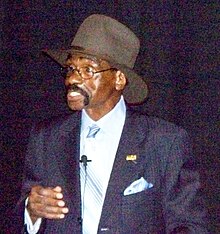Rubin Carter
| Rubin Carter | |
|---|---|

Rubin Carter in 2011 at the Bunker Hill Community College
|
|
| Statistics | |
| Nickname(s) | Hurricane |
| Rated at | Light heavyweight |
| Height | 5 ft 8 in (1.73 m) |
| Nationality | Canadian |
| Born |
May 6, 1937 Clifton, New Jersey, U.S. |
| Died | April 20, 2014 (aged 76) Toronto, Ontario, Canada |
| Stance | Orthodox |
| Boxing record | |
| Total fights | 40 |
| Wins | 27 |
| Wins by KO | 19 |
| Losses | 12 |
| Draws | 1 |
| No contests | 0 |
Rubin "Hurricane" Carter (May 6, 1937 – April 20, 2014) was a middleweight boxer who was wrongfully convicted of murder and later released following a petition of habeas corpus after spending almost 20 years in prison.
In 1966, police arrested both Carter and friend John Artis for a triple-homicide committed in the Lafayette Bar and Grill in Paterson, New Jersey. Police stopped Carter's car and brought him and Artis, also in the car, to the scene of the crime. On searching the car, the police found ammunition that fit the weapons used in the murder. Police took no fingerprints at the crime scene and lacked the facilities to conduct a paraffin test for gunshot residue. Carter and Artis were tried and convicted twice (1967 and 1976) for the murders,and both served time in Rahway State Prison. After the second conviction was overturned in 1985, prosecutors chose not to try the case for a third time.
Carter's autobiography, titled The Sixteenth Round, which he wrote while he was in prison, was published in 1975 by Warner Books. The story inspired the 1975 Bob Dylan song "Hurricane" and the 1999 film The Hurricane (with Denzel Washington playing Carter). From 1993 to 2005, Carter served as executive director of the Association in Defence of the Wrongly Convicted.
Carter was born in Clifton, New Jersey, the fourth of seven children. He acquired a criminal record and was sentenced to a juvenile reformatory for assault, having stabbed a man when he was 11. Carter escaped from the reformatory in 1954 and joined the Army. A few months after completing infantry basic training at Fort Jackson, South Carolina, he was sent to West Germany. While in Germany, Carter began to box for the United States Army. He was later discharged in 1956 as unfit for service, after four courts-martial. Shortly after his discharge, he was convicted of two muggings and sent to prison.
...
Wikipedia
